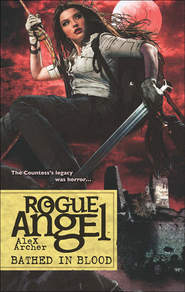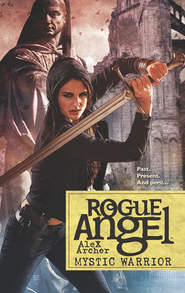По всем вопросам обращайтесь на: info@litportal.ru
(©) 2003-2024.
✖
Grendel's Curse
Автор
Год написания книги
2019
Настройки чтения
Размер шрифта
Высота строк
Поля
“Wow. Better grab a shovel, then. We’re going to be at this for a while.”
“Tell me about it,” Lars said. “It’ll take us a day to clear out what a backhoe could do in half an hour. But in this as in the rest of life beggars can’t be choosers. Lucky for you I’ve enlisted half of the horticultural department from the university to do the grunt work. Let the big strong farm boys do the backbreaking stuff.”
“Nothing wrong with a little extra muscle.” She held out her hand. “Pass the shovel.”
Lars handed her the shiny new shovel Thorssen had used to break the ground.
“Where do you want me?”
“Over there, we’ve marked out a trench where, according to geophys results, we believe the entrance to the barrow lies. Have fun.”
Annja hefted the shovel onto her shoulder, but before she walked off to lose herself in some good old-fashioned manual labor, she asked, “Do you really believe he’s down there?”
“It’s been a long time, and there’s no way of knowing for sure, but yes. I wouldn’t be getting involved in this unless I thought that there was the realistic chance of finding something.”
“That’s not the same as saying you think we’ll turn up Beowulf’s bones. We’re talking fourteen hundred years for grave robbers, looters, despoilers, defilers, never mind treasure hunters, and heaven knows what else to come along and plunder the barrow.”
“That’s always a risk,” the archaeologist agreed. “We won’t know until we’re inside. Just as we won’t know if this is the tomb of Böðvar Bjarki—the Norse warrior king from the Saga of Hrólf Kraki, for instance, whose story mirrors the legend of Beowulf in many significant areas. We know it was from Geatland that Böðvar arrived in Denmark, and moreover, that upon his arrival at the court there, he killed a monstrous beast that had been terrorizing the court at Yule for two years, not unlike Grendel. Of course, there’s no evidence as to whether Beowulf was real or not, but his character from the poem does fit seamlessly into the context of his society and Germanic family tree.”
“Seamlessly? It doesn’t exactly fit the poem, does it?”
“In terms of what we actually know, it’s difficult to say anything with certainty. The poem may have been composed as an elegy for a seventh century king like Böðvar, corrupting his name over time, but there’s little surviving evidence to indicate who it was actually written about, much like King Arthur. It’s a legend. And with all poems of the time, it has evolved with the telling and retelling. We have no idea who the original author was. Indeed, there’s as much as three hundred years between its composition and the oldest surviving manuscript, which remains unnamed. The poem itself wasn’t called Beowulf until the nineteenth century. Indeed, from the 1700s it was known as Cotton Vitellius A.XV, after Robert Bruce Cotton, the manuscript’s owner, and there was no transcription of it until 1818.”
She had heard much of this before, but Lars’s passion when he started in upon the subject close to his heart made every word fascinating.
“The burial rites described in Thorkelin’s Latin transcription bear a strong resemblance to evidence found at the Anglo-Saxon burial site at Sutton Hoo. Likewise Grundtvig’s Danish translation and Kemble’s subsequent modern English version echo the same funereal rites.”
“But wasn’t Beowulf’s body burned in a funeral pyre on a boat?” Annja recalled having read several retellings of the story as a child long before she’d ever encountered a direct scholarly translation. The image of the burning boat was always one that had stuck with her. If she closed her eyes she could see the flames and feel their heat on her skin. Fire.
“You are correct. The image of the Viking funeral boat sailing out ablaze does provide for a much more dramatic conclusion to the tale. Though I truly believe there has to be a reason why the site of Skalunda has become so intrinsically linked with everything we believe to be true about our hero. Stories don’t endure without a grain of truth to them, do they?”
It was a question she couldn’t answer, but she wasn’t entirely convinced by his reasoning. Yes, it made sense that the poem would have been changed over time. The only extant copy of the original showed at least two authors, and the story itself was riddled with dichotomies of paganism versus Christianity, which supported the notion that each subsequent teller of the epic tale had added their own beliefs to the core story, but was burial really a part of Nordic culture of the time?
“Well,” she said wryly, “the answer’s only a backbreaking dig away.”
3
They had been at it until well into the night, working in shifts and stopping occasionally for food, but now that the sun had finally set and everyone had been sent home, Lars could savor the scene. It was real. It was happening. After all of the paperwork, all of the begging, all of the disappointments, they were finally here, digging down to what could well be the biggest discovery of his lifetime.
He allowed himself a small smile.
Putting the dig together had been a herculean task, and while they were still a long way from finding anything, the sense of satisfaction he felt surveying the site couldn’t be denied. They could make do without the backhoes and all of the other machinery. It was all about what was down in the ground now. The team had spent most of the first day clearing the ground, cutting and rolling away a strip of turf a few inches deep to reveal the undisturbed soil beneath, then marking it so the sod could be relaid exactly where it had been. It had taken hours of painstaking work, but the students had put in a full shift, cutting out a trench almost six feet deep, three wide and fifteen long.
It had been a good day, and they’d ended it with a ritual wetting of the site, sharing a beer while they cleared the equipment. It had been one of the students who’d come up with the idea to have that beer out of an old horn, each taking a sip and passing the horn around the circle until it was empty. It was a nice ritual, and very in keeping with the nature of the dig. Then they’d taken a few shots to immortalize their handiwork for posterity, each of them standing beside the deep trench, beer horn in hand. They were all part of this great work, and for him there was no real difference between the workers and the queen. They were all in it together.
Bellis had taken a handful of the team who were bunked up in one of the caravans and headed into town in search of a bar, joking, “Tonight we drink, for tomorrow we dig!” It wasn’t exactly a war cry, but then, they weren’t going to war so it didn’t need to be.
The trailers were still in darkness.
A series of solar-powered garden lights lit up the trench.
Lars sat on the pile of turf that had been carefully set aside in numbered rolls and lit a cigarette. He breathed deeply, savoring the smoke before blowing it out in rings. He’d spent most of the day watching other people work. He was still full of energy and itching to play his part in the excavation. He knew that he wouldn’t be able to rest until he had at least got a little dirt under the fingernails. That would make it all seem real. That was just the kind of man he was.
He stubbed out his cigarette and went over to the main tent. The plans were laid out on the central table along with the geophys readings. He’d studied the information diligently and knew it like the back of his hand. The geophys readings were a little more complicated than the ones he was used to looking at; normally they would cover a flat stretch of a field while these ones were trying to plot the three-dimensional shape of the mound itself. He never tired of looking at those images. He’d watched the technicians with their equipment, taking carefully measured steps as the made their readings, one pace after another until they built up a picture of the shape beneath the ground. It was inspiring.
There was every chance that the body—if it had ever been there—would have been placed in a cavity, and sooner or later that would have collapsed in on itself, which meant they would have to deconstruct the entire barrow in the hopes of finding the remains. This wasn’t a quick two-week job. They could be here for the best part of a year or more painstakingly going over the ground before they found anything exciting.
Initial ground surveys suggested there was a change in the minerals in the mound, not much farther into it than they already were.
It could be nothing, but the shadow those minerals presented looked too uniform to be a natural phenomena.
Lars Mortensen had spent most of his adult life on digs like this. He knew not to make assumptions when it came to shadows on scans and what they might turn out to be, but he couldn’t help himself. He felt that itch just beneath his skin and it had to be scratched. An hour of digging, maybe two, and he’d break through far enough to at least make a reasonable guess as to what the curious shadow-shape was if not know for sure.
He picked up the heavy-duty lantern. Lars angled the beam directly at the scar in the side of the mound as he started to walk toward it. As the light played across the rich soil he thought he saw something glinting in the exposed earth. He swung the lantern, causing the light to roll, and again something caught the shifting light for a moment but no more. He played the light across it again, and again until he was sure he’d identified the source.
He assumed it was a shard of quartz that would have been barely visible as the team had worked in the setting sun, but it was worth investigating if for no other reason than satisfying his curiosity.
Lars set the lamp down on the edge of the trench so that its light filled it, and jumped down. It felt good to be right in the heart of it. He unhooked the trowel from his belt and knelt with a mixture of awe and excitement, placing his hands flat on the dirt. He almost imagined he could soak up everything this land had seen over the fourteen hundred years it had sheltered the hero. And for as long as his hands pressed into the earth he felt connected to each and every one of those years.
The glimmering caught his eye again. He knew it would be something and nothing, but he couldn’t shake the feeling that the single tiny reflection was calling to him like a beacon in the dark.
He ran a finger over the soil, sending a few tiny crumbs of earth tumbling away.
It wasn’t a tiny fragment of quartz or feldspar trapped in the exposed crust, that much was obvious. It was bigger than that.
He set the trowel aside and pulled out a brush. He knew it was clean. He’d cleaned it meticulously in preparation for the dig. He always did.
He gave the surface the lightest of touches with the tip of the brush, testing how easily it crumbled, if in fact it did.
He brushed aside more particles of earth while pressing his free hand a few inches below the gleam so he could catch every fragment that fell. It took time to reveal that the tiny reflection had come from something much larger than he could have reasonably expected.
With each brushstroke he revealed a little more of the gleaming surface, and the more dirt he brushed away the fiercer the gleam shone, taking on a peculiar blue-green iridescence in the beam of the high-intensity lamp.
He completely lost track of time while he worked.
Eventually he revealed its edge but carried on working around it, trying to find out just how big it was in the hope that it might give him a clue as to its purpose. The color reminded him of an oyster shell, but if that’s what it was, then it came from the biggest oyster he’d ever seen, and then some. It took time, but gradually Lars cleared away the dirt enough to make out that it was the size of a dinner plate. He brushed away a little more dirt until it was clear that there was a second one overlapping the first like a gray slate roof tile that had lost most of its luster, but there were still flakes that gleamed with that iridescent blue-green.
He wiped the brush free of dirt before slipping it back into his tool belt, and then reached for his trowel again. He ran its point along one of the exposed edges, working it slowly beneath the lip of the plate. He pressed gently on its handle with his free hand, testing its resistance before he even tried to work it loose, but even as he applied the slightest pressure it started to shift. He felt his heartbeat quicken as he fought back the rising mix of hope and panic. He had to stop himself from dropping his trowel to put both of his hands on the plate, but all of those years of discipline and training kept him from moving too quickly and damaging the artifact.
He had secured his trowel in place. As he did, he felt the plate shift, grinding grit between it and the overlapping second one. He relaxed his grip slightly and it started to ease ever so slightly out of the position it had been locked in for centuries.
He felt it give, just a touch, and then suddenly it came free from its neighbor.
It was heavier than he had expected, despite being wafer thin.
The edge bit into one of his fingers, slicing it deep and clean, like a freshly sharpened blade. His blood smeared across the surface of the strange artifact. He had no idea what it was—some kind of armor?
He was almost reverential as he lifted the find. He turned it over in the light to better look at both sides of it. The underside had none of the brilliance, even faded, of the topside. Lars reached up and placed it carefully on grass beside the lamp, intending to clamber out of the trench, and store the strange plate in the main tent, detailing its discovery and protecting the site from damp or moisture before turning in, but he didn’t do any of those things. Instead, he knelt back down in the dirt to examine the raw patch of earth he’d just exposed, curious to see if the plate was merely some decorative facing, or if he’d uncovered something more interesting.











